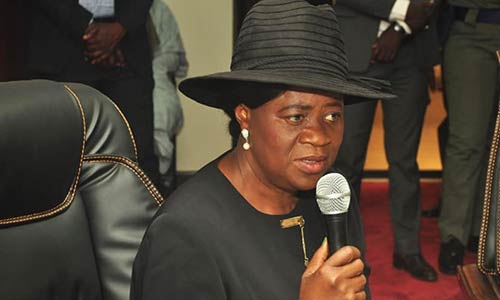The President of the Court of Appeal (PCA), Justice Monica Dongbam-Mensen has decried the increasing influx of substandard products into Nigerian markets.
Justice Dongbam-Mensen, who spoke in Abuja on Wednesday when a delegation from the Federal Competition and Consumer Protection Commission (FCCPC), led by its Executive Vice Chairman, Mr Babatunde Irukera, paid her a courtesy visit at her Chambers, decried that the country has become a dumping ground for all sorts of junks.
She said there was a need for strict enforcement of existing laws to ensure that products brought into the country are of good standards.
According to the PCA, “When you look at products coming into Nigeria, you will realize that Nigeria is being taken very much for granted. I know that some people prefer to buy products made for use in Europe than the ones made for Nigeria.
“Unfortunately, some of our businessmen go out and ask that the minimum standard should be made and brought for us. So once you buy, you are on your own.
“Some times, some of the products that come into this country, we buy them as new, but in reality, they are not even second-hand, maybe they are tenth-hand or they were deliberately fabricated not to work at all.
“So we end up with a lot of junks in our nation and we have no means of cleaning up our environment, we are like a dumping ground”, She said and called for economic balancing, saying, “the gap between the rich and the poor is getting too much, it is getting too wide.”
According to her, “If there is a deliberate and conscious attempt to ensure that there is equity, balance in the distribution of wealth, such that the not so wealthy or totally downtrodden are given an opportunity to participate in the economic development of the nation, I think a lot of our problems would be solved.”
While imploring the Commission to inline with its mandate, ensure strict enforcement of existing laws, Justice Dongbam-Mensen said, there are strict laws that ensure that good standards are maintained and that products brought into a nation are of good standards.”
Similarly, another Justice of the appellant court, Peter Ige, said there was a need for wider consultation with stakeholders when amendments are effected on Acts regulating operations of government agencies.
He said the duty of the Court was to declare what the law stipulated. “For instance, right now we don’t even have complimentary copies of your Act to know the areas that are in conformity or in conflict with the constitution.”
More so, Justice Ige said there was a need for the National Assembly to amend the laws to guarantee the enforceability of Chapter 2 of the Constitution.
“You do know that Chapter 2 of the constitution is a non-justiciable provision. When people talk about restructuring and all the rest, one would have thought that everybody will concentrate on Chapter 2 of the Constitution and make our National Assembly make them enforceable.
“This is so that everybody will know that all these rights or provisions, which is the purpose of government that are provided for in Chapter 2, we can enforce them and everybody can enjoy the benefits of governance, whether politically, socially, economically, commercially or otherwise.”
On his part, the Chairman of FCCPC, Mr Irukera, said the purpose of the visit was to intimate the Court of Appeal about operations of the Commission.
“The FCCPC is keenly interested and looks forward to the Court of Appeal’s kind indulgence in collaborating with the agency.
“One of our more urgent and crucial objectives is a knowledge-sharing opportunity where we present a more in-depth analysis of the FCCPA through knowledgeable faculty working with and through the National Judicial Council, and learning from this senior bench too, what the judicial considerations are in dispute resolution, as well as how best to present questions of law for the fairest and most meaningful outcomes and disposition,” he added.





